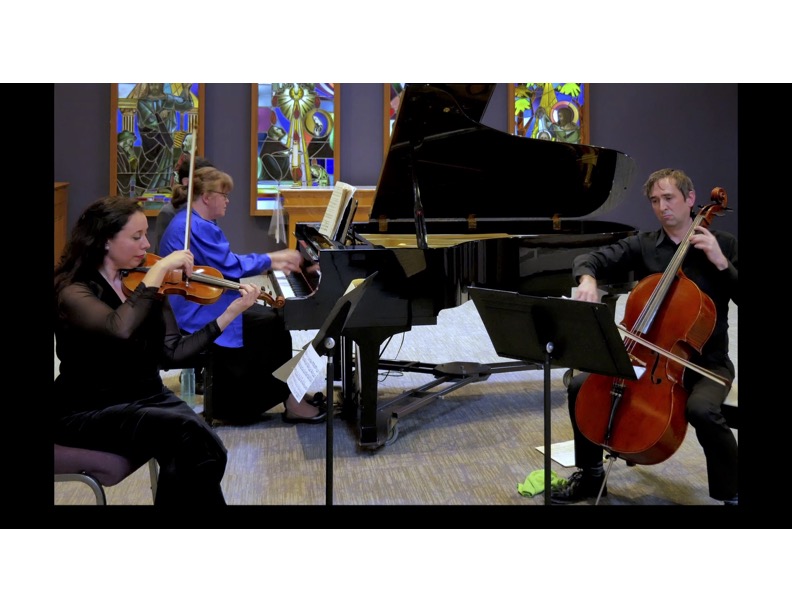
The Two Tales of Russia, presented by the Elixir Ensemble of Saskatoon on Feb. 19 at the Emmanuel Anglican Church, took the audience back to 20th-century Russia by integrating two famous Russian composers, Dimitri Shostakovich and Pyotr Ilyich Tchaikovsky.
Conjure the image of Russia at the height of the Second World War. Jewish people were sent en masse to gas chambers and fields of poppies became stained with the blood of almost 27 million Russians. This is what I was imagining as I listened to the first piece by Shostakovich in Two Tales of Russia.
At the time that Shostakovich wrote “Piano Trio No. 2 in E minor, Op. 67” — the first piece of the concert — he was both mourning his beloved teacher Ivan Sollertinsky’s death and grappling with anti-Semitism in Russia.
Dr. Hedlin, an assistant professor at the College of Medicine, opened this piece with a tone that became an embodiment of the deep lament that Shostakovich felt.
The lament became unease as the piece sped up, and the violin became the main course of melody. The piano, played by Solose, a professor of piano in the department of music, jammed away.
Then came the scherzo — a “lively” movement in a symphony — that began a brutally fast tempo, with plucks on the cello and violin indicating snarls of aggression.
The Elixir Ensemble then moved onto the largo — a very slow tempo. According to some interpretations, Shostakovich wanted this section to convey the image of banged hammers on railway tracks by Jewish forced labourers.
The finale brought the audience back to the image of the guards that forced Jewish people to dance beside their graves right before their execution.
The violin, played by Saskatoon-based violinist Oxana Ossiptchouk, and the cello slowly dissipated through a series of harmonics — notes produced in string instruments when fingers lightly touch the string.
It is incredibly difficult to execute the harmonics in a higher position on string instruments. One centimetre off and the beautiful sound turns into a jarring screech — the Elixir Ensemble did it perfectly.
After a brief 15-minute minute following “Piano Trio No. 2 in E minor, Op. 67” it was back to playing. This time, Tchaikovsky’s “Trio in A minor, Op. 50” was performed, taking us back to the 1880s.
Though Tchaikovsky was initially skeptical of his piece succeeding, the Elixir Ensemble’s performance nearly a century later halfway across the world shows that his music has had a long-lasting impact.
It will also have a long-lasting impact on me because seeing the three players execute the pieces perfectly made me admire the adversities that classical musicians face behind the curtains to perform on stage for even a short while.
Divided into three parts, the piece is less marred by the ruins of wartime Russia than Shostakovich’s piece, but similarly features an elegy for Tchaikovsky’s friend and mentor, Nikolai Rubinstein.
“Trio in A minor, Op. 50” opened with violin music. Hedlin’s cello then joined the melody, followed by Solose with a series of soft arpeggios. In this part, as the theme melody repeated itself in different variations, I could hear the slow, effluent emotions coursing through the music.
The second part awakened the listeners to a more light-hearted melody. It drifted into a light, nostalgic memory where I could envision the times that Rubinstein and Tchaikovsky spent together.
Finally, with a turn of the church bell, marked by the harmonic turns, the ground shifted. I could hear the evident change in the dynamic of the piece as the sad opening theme repeated. The entire trio changed the imagery into a ghostly funeral that concluded the liveliness of the concert.
Though Tchaikovsky’s piece was longer than Shostakovich’s, at 55 minutes, the slower-paced entertainment of a classical music concert was worth sitting through because both parts flowed seamlessly together. I sat through the second piece, mesmerized, with my eyes glued to the stage when the room unexpectedly became quiet.
The three musicians bowed, followed by a standing ovation from the audience. After an hour and a half of playing, the church no longer sounded like the combination of a war-torn Russia and deep grief.
Annie Liu | Staff Writer
Photo: Supplied by Erich Keser
Leave a Reply